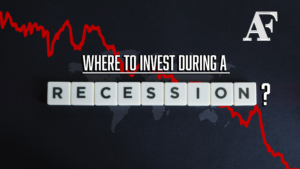Economic downturns are similar to stormy weather patterns in the economy; difficult and unstable, but not indestructible.
Most investors view recessions with trepidation, seeing them as times of possible financial devastation.
However, with proper information and planning on where to invest during a recession, these downturns can be used as a means for massive long-term growth.
If you are looking to invest as an expat or high-net-worth individual, which is what I specialize in, you can email me (advice@adamfayed.com) or WhatsApp (+44-7393-450-837).
This includes if you are looking for a second opinion or alternative investments.
Some facts might change from the time of writing. Nothing written here is financial, legal, tax, or any kind of individual advice or a solicitation to invest.

Recession Definition
Recession is not a buzzword, but rather a complex economic phenomenon that denotes a sharp decline in economic activity.
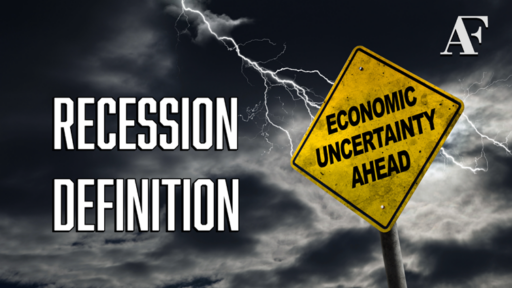
Recessions typically last between nine and eighteen months and are characterized by several main indicators:
- Declining Gross Domestic Product (GDP)
- Rising levels of unemployment
- Reduced consumer expenditure
- Declining industrial output
These economic downturns are not coincidental occurrences but are part of the economic cycle.
They operate as natural rebooting mechanisms, clearing inefficiencies and making the way for more robust economic paradigms.
To accept this way of thinking renders recessions more plausible economic transitions than frightening financial disasters.
How to Invest Before a Recession
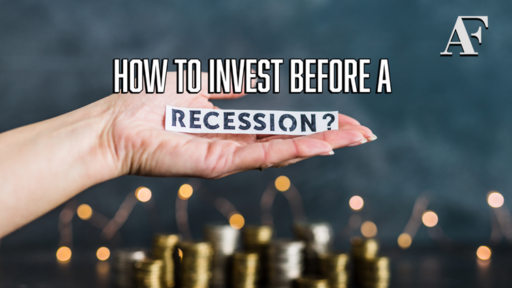
The wisest investors don’t sit around and wait for a recession to occur. Instead, they plan ahead.
Consider planning ahead, like building a money storm shelter before an anticipated storm. The foundation of planning ahead is building significant cash reserves.
For non-retirees, financial professionals suggest keeping three to six months of living costs in low-volatility, easily accessible accounts.
Retirees face a tougher challenge. They usually require a larger cushion, preferably two to four years’ worth of expenses, to avoid having to sell during bear markets.
Portfolio rebalancing is paramount in this building phase.
No sweeping reform is needed but strategic adjustments.
Investors need to examine their asset allocation closely, reduce their exposure to speculative positions, and close their structurally weak positions.
The objective is the construction of a shock-absorbing portfolio that will be able to withstand economic storms.
How to Invest During a Recession
Dollar-cost averaging becomes a significant strategy in the face of economic downturns.
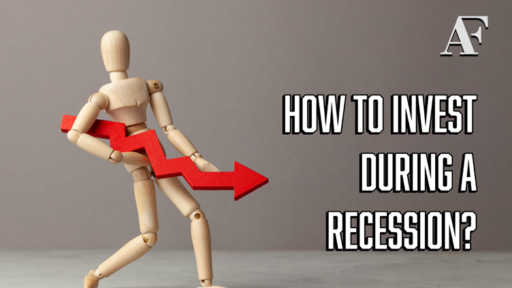
It is about investing a given amount at stipulated intervals even when the prices are falling.
When prices reduce, your stated investment buys more shares, basically reducing your overall purchase price per share.
Take a real-life example:
If you invest $500 a month in a mutual fund that has a price of $25 per share, you’d buy 20 shares.
During a recession, and when the price of the same fund falls to $20 per share, your $500 buys you 25 shares.
This system makes the market drops beneficial for you without having to time the market on a continuous basis.

Where to Invest During a Recession
Not all industries decline in proportion during recessions. There are some whose operations are much better, acting as economic shelters.
No investment can ever be called recession-proof, but some hold up better in recessions than others.
Utilities, healthcare, and consumer staples tend to do well in recessions. These are fundamental services and products that are always in demand, irrespective of the economy.
The companies whose shares are listed in the stock market are grouped into sectors.
Sectors are the categories that are related to the business activity of the company. Given below are some of the better-performing sectors during a recession:
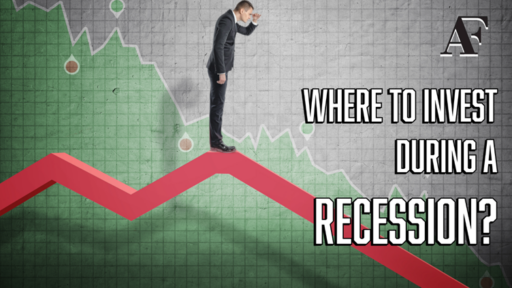
- Communication services
- Consumer discretionary
- Consumer staples
- Energy
- Financial Services
- Healthcare
- Industrial
- Information technology
- Materials
- Real estate
- Utilities
Large-cap stocks
If you do choose to invest in individual stocks during a recession, then you could look at opportunities in the industries listed above.
But there are other factors to take into consideration:
- Low debt
- Profitability
- Solid balance sheets
- Positive cash flow
These aspects can enable a company to ride through tough economic times.
Sector-tracking funds
Investing in mutual funds like low-cost index funds and exchange-traded funds (ETFs) is usually a better bet than investing in stocks.
This is a suggestion from several financial experts that may be particularly appealing during a recession.
Fixed-income investments
Investors like to pour money into dividend-based investments (like dividend stocks) or fixed-return investments (like bonds) during recessions since they pay back recurrently.
Important Considerations
Unexpectedly, recent downturns have underlined the resilience of several of the technological advances.
Those offering digital infrastructure, cybersecurity, and remote work solutions are exhibiting exceptional resilience.
This underlines how technological resilience breeds economic resilience.
Perhaps most important to surviving economic downturns is having an even emotional equilibrium.
Successful investors understand that all economic downturns in history have eventually yielded to growth and recovery.
This view is not blind optimism but a reasonable and disciplined one.
It is about systematic strategic investments, avoiding emotional decisions, and viewing downturns in the markets as opportunities and not as end-of-the-world events.
How to Protect Your Investments During a Recession
Successful recession investing is more than technical strategy, it takes psychological discipline.
The best investment strategy in the world can crumble if emotional responses result in panic selling or rash action.
Investors need a long-term perspective, extending their investment horizon to at least five years. This approach enables them to ride out short-term volatility while monitoring ultimate market recovery.
History consistently proves that markets recover eventually, often with spectacular growth following prolonged contractions.
Young investors with years to retirement can view recessions as special opportunities.
With secure income from jobs and minimal short-term investment withdrawal needs, they can:
- Increase retirement contributions
- Opt for aggressive dollar-cost averaging
- Invest in short-term undervalued growth investments
Retirees and near-retirees, on the other hand, need to be even more cautious.
The “bucket strategy” is priceless: dividing the assets into short-term (0-2 years), intermediate-term (3-10 years), and long-term (10+ years) buckets according to the speculated fund usage.

Where Not to Invest During a Recession
As mentioned earlier, not all investments are created equal during recessions. Investors with a strategic approach should steer clear of:
- Cyclical industries with an increased demand in volatility
- Luxury goods companies
- Highly leveraged businesses
- Unproven startups with limited cash reserves
Firms with too much debt do not perform well in recessions.
Falling revenues make interest payments challenging, tighten the credit markets, and impact the operating flexibility.
FAQs
Q. Where Should You Put Money in a Recession?
During recession periods, invest in low-risk, safe investments that are stable and provide steady returns with protection.
Your top picks are:
- Government and corporate high-grade bonds
- Treasury notes and bills
- Money market accounts
- High-yield savings accounts
- Dividend stocks of industries such as consumer staples, healthcare, and utilities
- Short-term certificates of deposit (CDs)
The trick is to increase liquidity without increasing risk and maintaining capital during market uncertainty.
Q. What Stocks to Invest in During a Recession?
Look for stocks that possess the following features:
- Strong balance sheets
- Long histories of sustaining dividends
- Essential service companies
- Low debt burdens
- Sustaining cash flows
Some of the stocks to consider belong to sectors like utility providers, medical service companies, producers of consumer staples, etc.
Q. What is the Best Thing to Buy in a Recession?
The “best” to invest depends on personal finance goals, but the highest recommendations include:
- Index funds that track defensive sectors
- Dividend-paying high-quality stocks
- Government securities
- Treasury securities
- Real estate in safe markets
- Exchange-traded funds (ETFs) invested in key industries
Select solid investments that generate steady returns and provide an opportunity for long-term appreciation.
Q. Should I Invest During a Recession?
Yes. Recessions are special investment opportunities. Clever actions are:
- Waiting it out with steady investment contributions
- Practicing dollar-cost averaging
- Buying high-quality assets at discounted prices
- Focusing on the long term
- Avoiding emotionally driven, reactive investment decisions
- Diversifying your investment portfolio
Keep in mind that successful investors view recessions as an opportunity to get wealthy by buying undervalued assets.
Q. What Not to Buy During a Recession?
Steer clear of high-risk and exposed investments, which typically comprise:
- Stocks of luxury brands
- Companies with high leverage
- Speculative investments in new startups
- Stocks of cyclical industries
- Non-essential retailing businesses
- Tourism and hospitality industry stocks
- Businesses with poor financial fundamentals
- High debt investments
These types of investments are bound to endure severe value depletion in times of economic downturn.
Q. Who Benefits from a Recession?
A few categories of people/firms who gain from economic recessions are:
- Patient long-term investors
- Value investors looking for bargain assets
- Cash-infused firms with solid balance sheets
- Professionals working in the essential service sector
- Diversified, stable portfolio investors
- Low-debt holders with stable incomes
- Strategic purchasers looking for underpriced assets
- Defensive industry companies
The biggest winners are those who are not fearful, are financially disciplined, and view downturns as strategic investment opportunities.
Conclusion
Recessions are not monetary catastrophes but natural patterns of the economy.
By overcoming the challenges with knowledge, preparation, and a disciplined strategy, investors can improve their long-term financial returns.
The key is that economic downturns are temporary.
Your approach today will be the source of gigantic potential down the road.
Embrace readiness, maintain vision, and most importantly, be patient and wise in the world of investing.
Pained by financial indecision?

Adam is an internationally recognised author on financial matters with over 830million answer views on Quora, a widely sold book on Amazon, and a contributor on Forbes.

